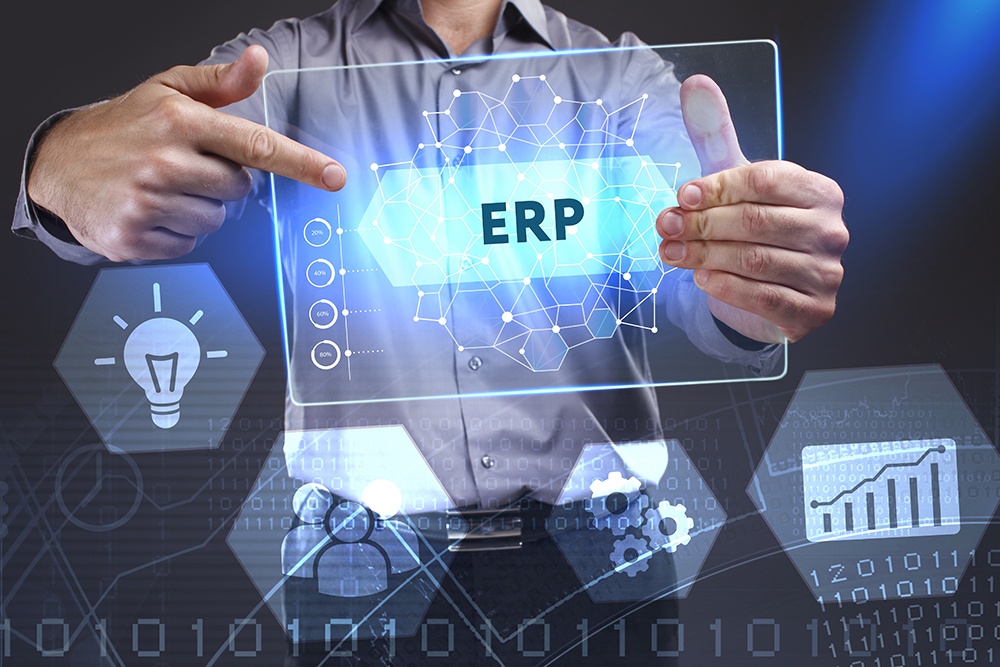In the era of digital transformation, the application of modern management systems plays a key role in helping businesses optimize resources and improve operational efficiency. Behind the success of ERP projects is the team. ERP Specialist – those who contribute to implementing, operating and ensuring the ERP system brings out its true value. So What is an ERP specialist?? What role do they play in the business? Let's find out through the article below.
1. What is an ERP Specialist? Understanding ERP Specialist
When the business starts to deploy ERP system, to understand clearly What is an ERP specialist? and their importance is indispensable. These are the people who act as a bridge between the business, the software supplier and the implementation team, ensuring that the ERP system operates smoothly and is suitable for the specific business.
1.1. Definition of ERP Specialist
What is an ERP Specialist? ERP Consultants are people with in-depth knowledge and experience in implementing, operating and optimizing Enterprise Resource Planning (ERP) systems. These are experts who act as a bridge between technology and business needs, helping businesses design and effectively apply ERP software to management.
Unlike ERP staff – those who operate and maintain the system within the enterprise, ERP specialists often play the role of consultants, implementers, supporters and optimizers of ERP software processes. They understand ERP modules (such as Accounting, Logistics, Purchasing, Sales, Human Resources) and are closely involved with the enterprise from planning, implementation to operation.

1.2. Importance of ERP Specialist
Clearly understand What is an ERP specialist? also helps businesses to properly perceive their influence in the digital transformation process. They not only understand internal needs, but also turn those requirements into practical solutions, limit risks, and ensure ERP implementation achieves optimal efficiency.
ERP implementation is not simply about installing software but a major process surgery in the enterprise. Therefore, the role of ERP specialists is extremely important. They are the ones who:
- Understand business needs and convert into technical requirements.
- Consulting suitable solutions, ensuring feasibility and effectiveness.
- Managing the Deployment Process, reduce the risk of failure.
- User Training, ensuring the system operates smoothly after handover.
Therefore, success or failure of an ERP project depends largely on the capacity and experience of the ERP specialist team.
2. Roles and responsibilities of ERP Specialist in the project
Once understood What is an ERP specialist?, businesses also need to understand their key roles throughout the ERP project lifecycle – from consulting to implementation and post-go-live support.
2.1. Consulting Role
From business analysis, identifying needs to implementation planning, ERP Specialist Act as the project's "chief architect."
- Business analysis and needs identification:
ERP specialists work directly with departments within the business to understand operations, identify current processes, detect bottlenecks, and identify improvement needs. - Propose suitable solutions:
Based on the requirements and industry, ERP specialists recommend suitable modules (such as accounting, HR, purchasing, sales…), necessary customizations and approval flows that fit the internal processes. - Deployment planning:
They build a detailed implementation roadmap: timeline, resource allocation, testing, training, and acceptance phases – ensuring every step is planned.
2.2. Deployment Role
Different from ERP staff operational ERP Specialist Directly install, configure, customize the system and migrate data from legacy software.
- System installation and configuration:
Based on the agreed solution, ERP specialists set up initial parameters, create data structures, set up business rules and processing procedures. - Customize the system:
Not all businesses use “off-the-shelf” products. Therefore, ERP specialists need to work with programmers to build reports and specific functions according to customer requirements. - Data entry and conversion:
An extremely important step is to migrate data from the old system to the new ERP, requiring a thorough understanding of both systems to avoid data loss.
2.3. Post-Implementation Management and Support Role
After the project goes live, ERP Specialist continue to play a management role, support users and evaluate system upgrades, helping businesses exploit ERP long-term.
- Project implementation progress management: Define detailed plans, manage tasks, schedules, resources and budgets, ensure work is completed on schedule and with quality.
- User support and training: Support user guidance and training on how to use the ERP system effectively, build training roadmaps and provide complete documentation.
- Troubleshooting and ongoing support: Receive feedback, resolve user queries, troubleshoot and provide timely solutions, accompany throughout the system operation process and after project implementation.
- System evaluation and upgrade: Evaluate requirements and recommend upgrades or modifications to meet new customer needs and market changes, ensuring changes are implemented appropriately without significantly impacting current operations.

3. Skills required of a good ERP Specialist
To answer the question completely What is an ERP specialist?, it is indispensable to mention the skill set they need to have: from deep expertise to soft skills such as communication, training and project management.
One ERP staff Usually only operating skills will be required, while ERP Specialist requires a combination of expertise, consulting and problem solving skills.
3.1. Extensive professional knowledge
- Extensive knowledge of ERP software: Master professional knowledge and practical experience in ERP implementation process.
- Understanding of business operations and operating procedures of departments: This makes it easy for them to support and provide solutions to each business problem.
- Understanding of information technology: Especially about ERP software.
3.2. Important soft skills
- Communication and consulting skills: The ability to easily communicate content, share and analyze it easily, promote collaboration among stakeholders (customers, developers, project members, end users), and listen to feedback.
- Training and coaching skills: Ability to communicate and train, build appropriate roadmaps and documentation so that users can easily absorb and use the system proficiently.
- Problem solving skills: Ability to closely monitor, respond and provide effective solutions when problems arise during implementation or operation.
- Presentation skills: Ability to introduce and convince customers to use ERP system in an impressive and effective way.
- Management skills: Especially project management, including planning, risk management, and resource management.
4. The Relationship Between ERP Specialists, ERP Software and Specialized Support Solutions
For an ERP system to bring practical value to a business, there needs to be close coordination between ERP software, implementation specialists and specialized support solutions.
This relationship helps ensure that ERP is not just a management tool, but also becomes a solid foundation for business operations and comprehensive digital transformation.
4.1. What is ERP and why do businesses need it?
ERP (Enterprise Resource Planning) is an integrated software system that helps manage all business resources - from finance, human resources, purchasing, sales, production to logistics.
ERP is a comprehensive management platform, and having ERP Specialist The implementation manager will help businesses get the most value out of the software.
A standard ERP system includes modules such as:
- Accounting – Finance
- Sales & CRM
- Warehouse – inventory management
- Manufacture
- Human resource management
- Project Management
- Machine Maintenance Management System (CMMS)
- Connect e-commerce & other systems
A good ERP system helps businesses:
- Reduce errors due to manual data entry
- Increase management efficiency
- Improve decision making speed
- Optimize cash flow and operating costs

4.2. Bizzi – Dedicated financial solutions and comprehensive integration with ERP
While the system ERP Taking on the role of overall coordinator of business operations, many businesses realize that Some specialized functions — especially finance and accounting — still require specialized support solutions. to thoroughly handle specific requirements. That is why Bizzi was born as a powerful supporting platform for businesses in managing costs, invoices and debts.
As a complementary tool, Bizzi helps ERP Specialist and ERP staff Easy to operate and optimize financial and accounting processes when combined with ERP system.
Bizzi acts as a virtual financial assistant, helping accounting and finance departments save time, minimize errors and optimize operating costs. The special feature of Bizzi is that deep integration with existing ERP systems of the business.
Flexible and diverse integration capabilities with ERP systems
Bizzi is designed to be open, easily connecting to many popular ERP platforms on the market, from international software such as SAP, Oracle, Microsoft Dynamics to domestic systems such as Bravo, Misa, Fast, AMIS…
This integration is built on:
- Standardized API:
Bizzi provides public APIs, making it easy for partners or the enterprise's IT team to connect directly to the existing ERP system. These APIs support many different financial and accounting operations such as:
- Synchronize input/output invoice data
- Recording and handling debt
- Automate expense approval flow
- Update invoice processing results and reconcile to ERP
- Submit electronic invoice data to tax authorities as prescribed
- Synchronize spending management data and budget limits
- Real-time data synchronization:
Changes made to your ERP system, such as orders, receipts, invoices, or expense requests, are updated in sync with Bizzi — and vice versa. This helps businesses avoid data discrepancies, reporting errors, or manual duplication.
- Custom integration capabilities for specific business needs:
For units with special processes, Bizzi provides custom integration services, allowing to build their own data flows, ensuring compliance with internal business requirements.
Practical benefits when Bizzi integrates with ERP
- Automate the entire process of invoice processing - expenses - debts, eliminating 80-90% manual operations in checking, reconciling, and updating data.
- Synchronized, accurate data, helping the accounting department to process only once on ERP or Bizzi without having to repeatedly enter data on multiple systems.
- Support auditing and transparent reporting: Digital documents, electronic invoices, and debt reconciliation tables are easily stored and extracted, synchronized with accounting data and ERP.
- Respond quickly to changing business, tax, and invoice requirements: Bizzi always updates legal regulations on tax and invoices, helping the enterprise's ERP system not need complex self-adjustment.
- Save IT costs: Thanks to the built-in connectivity, businesses do not need to invest heavily in an in-house integration development team.
Bizzi is not only a support tool, but also a "companion" with ERP.
Bizzi is not just a supplementary support tool, but acts as a “companion” to the ERP system in the business operation process. When integrated with ERP, Bizzi helps speed up the entire financial and accounting process, from invoice processing, expense control to debt management.
Automating these operations not only significantly reduces manual workload and reduces errors, but also ensures accuracy and transparency in all transactions. As a result, businesses save time, personnel costs and IT system operating costs.
Furthermore, the combination of Bizzi and ERP also helps businesses flexibly respond to continuous changes in legal regulations and new management requirements, contributing to building a more sustainable and effective operating platform in the long term.
5. Conclusion
Through this article, I hope you have understood clearly. What is an ERP specialist? and why they play a vital role in every project ERP implementationIn the digital age, it is important for businesses to have a team of ERP Specialist and ERP staff Professionalism, in-depth understanding of systems and operations, is the key to optimizing resources, sustainable growth and maintaining competitive advantage.
ERP specialists are the bridge between technology and business operations, and are the companions who help ERP projects not only stop at successful implementation but also promote long-term value in production and business activities.
To optimize resources and maximize the power of the ERP system, businesses need to clearly understand the roles, tasks and essential skills that an ERP specialist needs to have, thereby building and developing a professional team that is suitable for the growth strategy.
In the context of increasingly strong digital transformation, ERP is no longer a single tool, but needs to be flexibly coordinated with specialized solutions such as Bizzi to thoroughly solve financial - accounting and cost management problems.
This combination helps businesses operate smoothly, adapt quickly to market fluctuations and the legal environment, and improve competitiveness. Investing in the right people, the right systems, and the right technology will be the key for businesses to break through and grow sustainably in the digital age.

